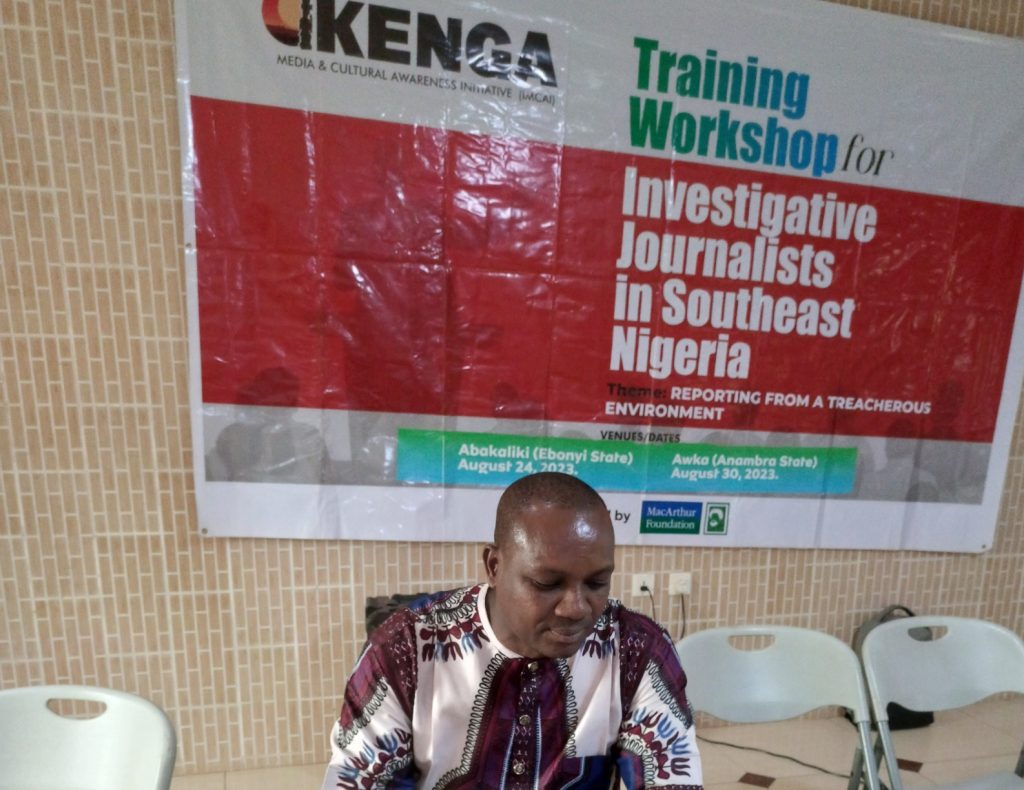As Ikengaonline trains Ebonyi journalists on Investigative reporting
Ike Nnachi, Abakaliki
Journalists have been urged to consider the legal and security implications of their reportage of sensitive issues both to themselves and to the general public.
A Lawyer with the Ebonyi Command of the Nigeria Police, Eze Chinagorom Ndubuaku, made the call in Abakaliki capital of Ebonyi State.
He spoke during a one-day training for journalists in the state organised by Ikenga Media & Cultural Awareness Initiative (IMCAI) publishers of Ikengaonline Newspaper.
The workshop was organised with the support of the Wole Soyinka Centre for Investigative Journalism and the MacArthtur Foundation.
Mr Chinagorom, an Assistant Superintendent of Police working in the Legal Department of the Police of Ebonyi State noted that the decision to disclose information and accept the risk of news coverage should be carefully considered, weighing the benefits against the potential risks and red flags associated with the information.
He advised against reports that may lead to breakdown of law and order or worsen existing crisis.
He urged Journalists to evaluate whether the dissemination of the information could cause harm to innocent individuals or negatively impact their lives.
According to him, “If it puts others at risk, it may not be worth the risk of news coverage.”
“If the information puts individuals or their loved ones at risk of physical harm or jeopardize their personal safety, it may not be worth the risk of news coverage.”
“Journlaists should consider whether the information is of significant public interest or importance. If it is trivial or irrelevant, it may not be worth the potential risks associated with news coverage,” he said.
He further urged Journalists to be mindful of the source of the information and the motive for presenting them with the information.
He warned against relying on information from politicians and politically exposed individuals who may have ulterior motives.
He said: “If the information comes from unreliable or unverified sources, it should be treated with caution. Journalists should verify the credibility and accuracy of their sources before relying on them for reporting.
“If the information is based on unverified or unreliable source, it may not be worth the risk of news coverage, as it could damage one’s reputation or credibility,” he said.
The Lawyer also warned Journalists to be wary of legal implications in order not to run foul of the law.
He said: “If the information is illegal or involves illegal activities, it is important to carefully weigh the potential; consequences of news coverage including potential legal actions or repercussions.
“For instance Section 12 (1) (a) and (b) of Ebonyi State Internal Security Enforcement and Related Matters Law 2009 criminalized Causing Extreme Fear and Threat to Life by use of letters, phone calls and other electronic methods.
“Section 14 of the same law criminalized false information. The Cyber Crime (Prohibition Prevention etc) Act, 2015 criminalized Cyberstalking, Cybersquatting and Cyber Terrorism. The Evidence Act 2011 alongside some consequential amendments now allows electronically generated evidence during proceedings,” he said.
Mr Chinagorom further advised Journalists to also consider whether the information violates any ethical guidelines or principles.
“If it involves invasion of privacy, breach of confidentiality, or harm to vulnerable individuals, it may not be worth the risk.”
“Overall, playing it safe during news coverage is essential for journalists to protect themselves, their sources and the public interest while maintaining their credibility and adhering to legal and ethical standards,” he added.
The workshop had in attendance Journalists from various national and local media houses in the state.

